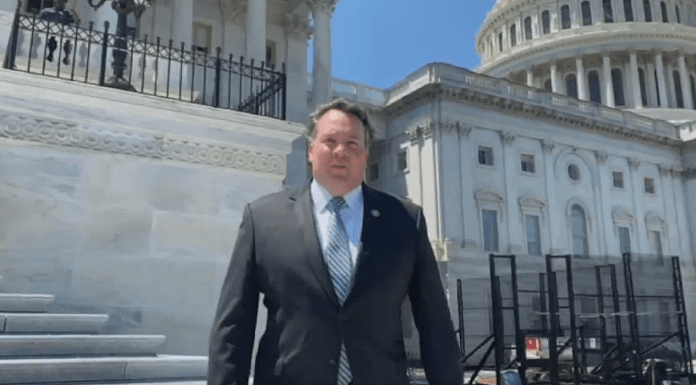(Money Metals News Service) As America faces the twin threats of inflation and bank failures, three U.S. congressmen introduced a pivotal sound-money bill that would enable the Federal Reserve note “dollar” to regain stable footing for the first time in more than half a century.
Rep. Alex Mooney, R-W.Va., joined by Reps. Andy Biggs and Paul Gosar, both Arizona Republicans, introduced H.R. 2435, the Gold Standard Restoration Act, to facilitate the repegging of the volatile Federal Reserve note to a fixed weight of gold bullion.
Upon passage of H.R. 2435, the U.S. Treasury and the Federal Reserve are given 24 months to publicly disclose all gold holdings and gold transactions, after which time the Federal Reserve note “dollar” would be formally repegged to a fixed weight of gold at its then-market price.
Federal Reserve notes would become fully redeemable for and exchangeable with gold at the new price, with the U.S. Treasury and its gold reserves backstopping Federal Reserve Banks as guarantor.
Monetary experts have noted a return to a gold standard would substantially curtail the economic damage caused by inflation, runaway federal debt and monetary-system instability.
“A gold standard would protect against Washington’s irresponsible spending habits and the creation of money out of thin air,” said Rep. Mooney in a statement.
“Prices would be shaped by economics rather than the instincts of bureaucrats,” he continued. “No longer would American families, businesses, and the economy as a whole be at the mercy of the Federal Reserve and reckless Washington spenders.”
The Gold Standard Restoration Act also makes several findings as to the harm the Federal Reserve System has inflicted on everyday Americans—particularly since President Richard Nixon “temporarily suspended” gold backing of America’s monetary system in 1971.
H.R. 2435 points out: “The Federal Reserve note has lost more than 40 percent of its purchasing power since 2000, and 97 percent of its purchasing power since the passage of the Federal Reserve Act in 1913.”
Historians have observed that the elimination of gold redeemability from the monetary system freed central bankers and federal government officials from accountability when they expand the money supply, fund government deficits though trillion-dollar bond purchases, or otherwise manipulate the economy.
“At times, including 2021 and 2022, Federal Reserve actions helped create inflation rates of 8 percent or higher, increasing the cost of living for many Americans to untenable levels…enrich[ing] the owners of financial assets while… endanger[ing] the jobs, wages, and savings of blue-collar workers,” H.R. 2435 states.
Notably, Mooney’s bill also would require full disclosure of all central bank and U.S. government gold holdings and gold-related financial transactions over the last 6 decades—a seemingly taboo subject surrounded by mystery and deception.
“To enable the market and market participants to arrive at the fixed Federal Reserve note dollar-gold parity in an orderly fashion… the Secretary and the Federal Reserve shall each make publicly available… all holdings of gold, with a report of any purchases, sales, swaps, leases, and any other financial transactions involving gold, since the temporary suspension in August 15th, 1971, of gold redeemability obligations under the Bretton Woods Agreement of 1944,” says the bill.
In the years leading up to Nixon’s panicked “temporary suspension” of gold redeemability, abusive U.S. deficit spending and currency debasement had prompted many foreign central banks to turn in their Federal Reserve notes for gold.
However, this disgorgement of America’s gold holdings was largely conducted in secret.
That’s why H.R. 2435 also requires the Fed and the Treasury to disclose “all records pertaining to redemptions and transfers of United States gold in the 10 years preceding the temporary suspension in August 15, 1971, of gold redeemability obligations.”
U.S. sound money groups and industry leaders are cheering Mooney’s actions.
“Government cannot continue to spend and print on a massive scale without producing existential threats to the currency and our economy,” said Lawrence W. Reed, president emeritus of the Foundation for Economic Education.
“The gold standard never failed America, bad ideas and bad politicians did. If we do nothing, disaster awaits us just as it drowned earlier civilizations that spent and inflated their way to ruin,” Reed continued.
“Today’s debt-based fiat-money system serves primarily to support big government and wealthy financial insiders—while the Federal Reserve’s serial policy of currency debasement punishes savers and wage earners,” explained Stefan Gleason, president of the Sound Money Defense League and Money Metals Exchange.
“A return to gold redeemability would arrest the problem of inflation, restrain the growth of wasteful and inefficient government, and kick off an exciting new era of American prosperity,” Gleason concluded.
The full text of Rep. Mooney’s gold standard bill can be found here. It was introduced on March 30, 2023, and referred to the House Committee on Financial Services.
Recently named “Best Overall” gold and silver dealer in the United States by Investopedia, Money Metals Exchange serves almost 500,000 customers nationwide. A family-owned Idaho business founded in 2010, it also operates Money Metals Depository for vaulting of gold and silver and Money Metals Capital Group, a collateral lending institution.
The Sound Money Defense League is a non-partisan public policy group working nationally to restore sound money at the state and federal level and publisher of the Sound Money Index.

